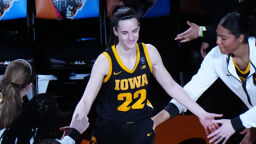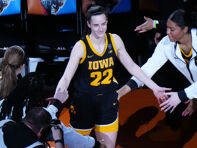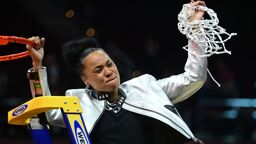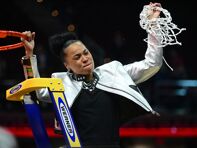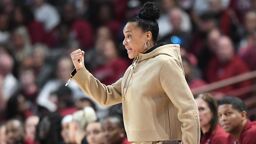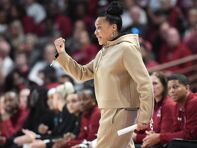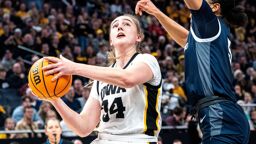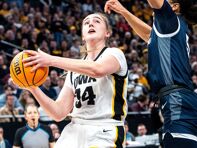On Feb. 8, 1992, Christian Laettner and his Duke Blue Devils, the defending NCAA champions, took to the court in Baton Rogue, La., against LSU and its star, Shaquille O'Neal. The crowd was in full froth and serenaded Laettner all game with nasty homophobic slurs.
"Faggot! Faggot! Faggot! Faggot" was one chant. The other, as described by then-Duke assistant Jay Bilas, now an ESPN analyst, went like this: "The LSU crowd, they did kind of the tomahawk chop at Laettner, except they were chanting: 'homo-sex-ual!' The TV announcers knew what was happening and one said, "We can't tell you what they are saying."
Thanks to "I Hate Christian Laettner," the wonderful "30-for-30" documentary that aired on ESPN Sunday, we get to see the crowd and hear the chants directed at the college basketball player everybody outside of Durham, N.C., hated. The segment on the gay slurs takes up five minutes of Rory Karpf's film, but from my angle is the most gripping part of the story for showing how vile and abusive fans can be and how things have changed for the better.
"To be honest with you, it hurt and I didn't like it," says Laettner, 45, married with three children, "but the media makes a big deal about a lot of stuff that shouldn't be made a big deal of. I just realized it was something I couldn't control, so when you look in the mirror, you know the truth, and rumors that I was gay in 1992, that was shocking and not very socially acceptable."
The "Laettner is gay" rumor spread because of three factors: He was a very good-looking "pretty boy," vain enough to fix his hair during a game; he made women swoon and this made other men jealous. He also was the best player on a great Duke team from 1989-92. Fans came to hate the team for its greatness, combined with a sense that these were a bunch of entitled preppies who got all the breaks; Laettner was the face of the team and opposing fans needed something to fuel their hate. Gay slurs were the order of the day.
"What would you say if something was not up to par? 'Oh, that's gay,' " said Ryan McGee, an ESPN The Magazine writer "What would say to the person you wanted to get to immediately? What was the cheapest thing you could say? 'He's a fag.' It was just part of what you said. It's embarrassing when you think back on it now, but that's where Christian Laettner fell into the world."
The third factor was Laettner's relationship with teammate Brian Davis. A story in Sports Illustrated at the time showed the two them posing on a rooftop holding a cat. In the story, as Duke player Grant Hill recalled, "Christian said three things things right now are important to me — basketball, school and Brian." Doug Collins, who coached Laettner in the NBA, said Laettner and Davis "would be walking on campus and he might reach down and hold his hand or reach over and give him a hug. Christian is like, 'OK, if that is what you want to say, go ahead and run with it.' " After Laettner graduated, he bought Davis a car, which Bilas said raised some eyebrows.
"We didn't exactly go on TV and talk about some gay shit," Davis recalled. "We're 21 years old and it was like, 'these motherf***ers hate us.' "
In an interview last week about the film with GQ, Laettner was asked about the gay rumors and how they started.
It lasted a little while. About four of five years. Then once I was in the NBA, I think it went away because people just knew that wasn't me. Then I got married and maybe it melted away after that. But that just happened because I said one silly thing to [Sports Illustrated writer] Curry Kirkpatrick when I was a senior and he's like the biggest Carolina fan. So I think he spun it out of context. He asked me something like, "What are you doing this summer?" I was like, "I just wanna hang out here with Brian." Brian was sitting right there and we laughed about it. Then it turns into this whole "Christian is Gay" thing. That was the stupidest thing ever and I never really put any thought into it.
It went beyond the pale, but I never said to myself that it was too much. It was just perception, not the truth. I know what I am. It was really easy to let that roll off my shoulder, but at the same time, it didn't feel good. I got teased about it. I would walk into arenas and all the fans would chant it. Then I'd be on campus and the football players would say it. That wasn't cool. But it wasn't that hurtful.
In watching the film, I was struck by the difference between 1992 and now. Crowds would regularly chant gay slurs at Laettner because he was the enemy and using such slurs were still widely accepted, especially in sports. This season, University of Massachusetts junior Derrick Gordon played the entire time as an openly gay player and did not hear a single slur. It's true that Gordon wasn't the superstar lightning rod player that Laettner was, but times have changed.
"At that point in time, we had not yet gotten to the point in society where we got serious about policing homophobic rhetoric," Duke professor Mark Anthony Neal says in the film. "You would hear crowds yell out homophobic slurs and rhetoric in these arenas in the early 1990s."
If crowds chanted gay slurs at a college basketball arena today, a dozen people would upload cellphone videos and Twitter and social media would be ablaze. If an announcer tried to bury it by saying "we can't tell you what they are saying," we would know immediately anyway. Overt homophobia in sports is no longer cool or acceptable, no matter the target.








